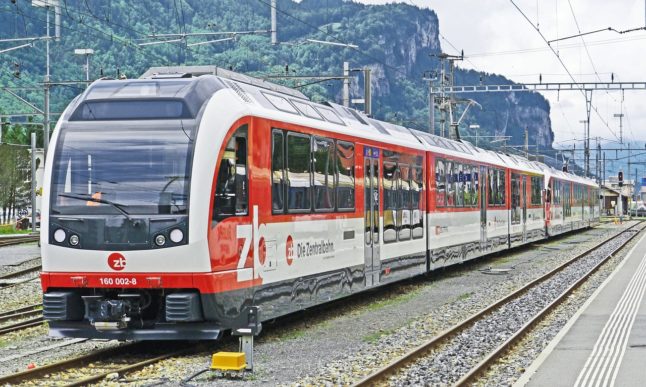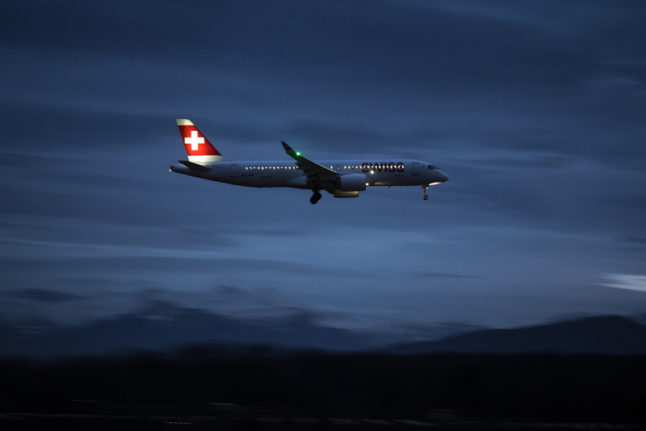When travelling by public transport in Switzerland you may wish to bring different types of luggage with you, from your ski gear for your winter vacation to your bicycle and dog.
But in Switzerland, there are limits as to what hand luggage you can bring along for the train ride.
First things first, what is considered hand luggage?
According to Alliance SwissPass, the regulations define that any item intended for personal use can be considered hang luggage.
While this may be a wide definition, there are some further restrictions as to what counts as hang luggage.
The maximum dimensions, for instance, are restricted to 120 x 80 x 100 centimetres. However, this doesn’t mean you can’t bring larger suitcases on board.
In fact, larger suitcases can be stored in the train’s open spaces as long as they do not get in the way of passengers or impact their safety.
You may also bring on board skis, snowboards, sleds, and skibobs (those bicycle-type frames that are attacked to skis).
There is no restriction as to how much hand luggage you may bring with you.
What about strollers?
Fortunately, most strollers are also considered hang luggage and you won’t have to pay an additional fee to bring one along for the journey.
Strollers can be stored in the carriage storage space or – if possible – folded up under seat or in the overhead luggage compartment.
If you are the owner of a push stroller that can be converted into a bicycle trailer you stroller will be considered a bicycle trailer – not a stroller.
In this case, you will need to pay an additional fee to bring your stroller on board.
READ MORE: Which European cities can you reach by direct trains from Switzerland?
Can I bring bicycles on board?
Speaking of bicycles, luckily, they too are generally considered as hang luggage though bringing them on board a Swiss train is slightly trickier than your average hand luggage.
If your bicycle can be folded up or carried in a special transport bag – called Tranzbag – it can be brought on a Swiss train for free. The Tranzbag can be purchased from Swiss public transport providers and costs anywhere between 100 to 150 Swiss francs, though cheaper alternatives are available online.
If your bicycle can’t be folded up or you do not buy the Tranzbag, you will need to pay a fee in the form of a ticket for your bike.
You can purchase a bike ticket (route, day, or GA) via the SBB app, at a machine, or online.
However, before you march towards a train with bike and ticket on hand, please note that with some connections, you will need to book a spot for your bike prior to your journey.
Reservations are mandatory on domestic sections of international trains (5 Swiss francs) but not on regional and interregional trains. However, during the summer months you will also need to make a bike reservation on every weekend IC train.
You can check the electronic timetable for the current bike requirements.
If this is too much hassle for you, you also have the option to check in your bike as hang luggage and have it delivered from home or from a train station to a destination within Switzerland. This handy option is understandably costly and passengers pay a flat rate senders fee of 43 Swiss francs per trip for a normal bicycle and an additional 20 Swiss franc fee for the bike.
Are the rules different for scooters?
Scooters with small wheels – known as Kickboards in Switzerland – can be brought on a train for free.
Scooters with larger wheels – known as Trottinett in Switzerland – are regarded as equivalent to a bicycle and hence the same rules apply. This is also the case for e-bikes.
Do I need to pay a dog fee?
If you’re looking to take the train with your pooch, then note that not all dogs travel free of charge on Swiss trains.
Owners of large dogs must keep their pet on a lead and you will also need to pay half a second-class ticket or a minimum fare for your dog.
READ MORE: What is Switzerland’s luxury GoldenPass Express train and is it worth it?
Owners of small dogs – any dog with a shoulder heigh of up to 30 centimetres – will not have to pay to bring their pet on board as long as their dog is inside a dog crate, transport bag or similar.
The crate or bag must be placed on the floor (not the seat). If you do place your doggy bag on the seat, you will need to purchase a ticket for your dog. The same rule applies if you choose to remove your small pooch from their crate or bag.
This article has been adjusted since publication to delete an incorrect section that covered items that could not be sent via the train delivery service, rather than brought on the train by passengers. We apologise for the mistake and the confusion caused.



 Please whitelist us to continue reading.
Please whitelist us to continue reading.
Are sure you can’t bring laptops, cameras, cameras and cell phones, watches, gemstones, cash, securities, check books, identification papers and similar documents?
Either you are VERY wrong, or everyone I have ever seen on a train is breaking the rules.
You have to be joking. According to this article, you are not allowed to bring identification documents or a cell phone on a train. Really?
Hi, yep thanks for pointing out. Apologies for the error, we’ve adjusted the article.
Perishable foods!?!? If I shop at Migros, I cannot bring the food home on the train?